Donna Sanders is the script supervisor, field producer and food editor for Where The Food Comes From.
This is her Behind-The-Scenes look at our day filming with the Virginia Peanut Growers Association.
I am so glad I am the assistant producer and not the producer of Where The Food Comes From. You see, in our case, it is producer and host Chip Carter who schedules and coordinates the interviews, and figures out all other logistics. Not easy.
The peanut shoot was all set for mid-October. But then it happened – the dreaded phone call telling Chip the peanuts were going to be harvested early. Well, not only did this shoot have to be rescheduled but others had to be changed as well. Somehow, he worked his magic and we were all set to roll for early October.
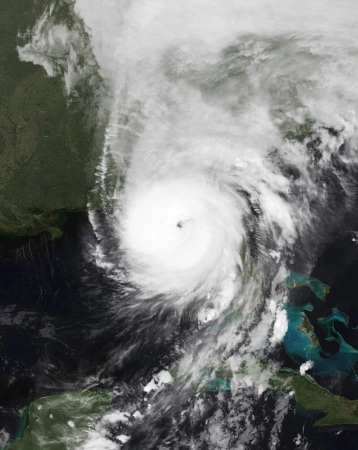
But Mother Nature had other ideas. And in late September the entire Southeastern United States felt the effects of Hurricane Helene. Were the fields destroyed? Thank God they weren’t, but due to 10-days of heavy rainfall the fields were WAY too muddy to harvest. Unfortunately, it was too late for us to reschedule so off we went. But no worries – Chip always gets his story.

Billy Gwaltney
And on October 3 our first stop took us to Indika Farms Inc Windsor, VA where we met up with co-owner Billy Gwaltney. The farm has been around since the 1800s with Billy’s family owning and operating it since 1948. Let’s check it out.
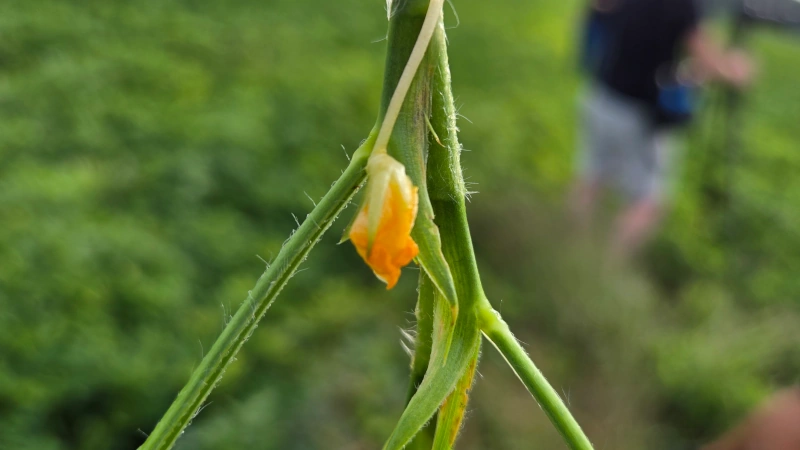
When we got to the fields there were two different colored flowers – yellow and blue and this kind of confused me. I have learned that different colored flowers typically means a different variety of crop. Turns out the blue flower is a Morning Glory – so pretty – and the yellow flower is actually the peanut flower.
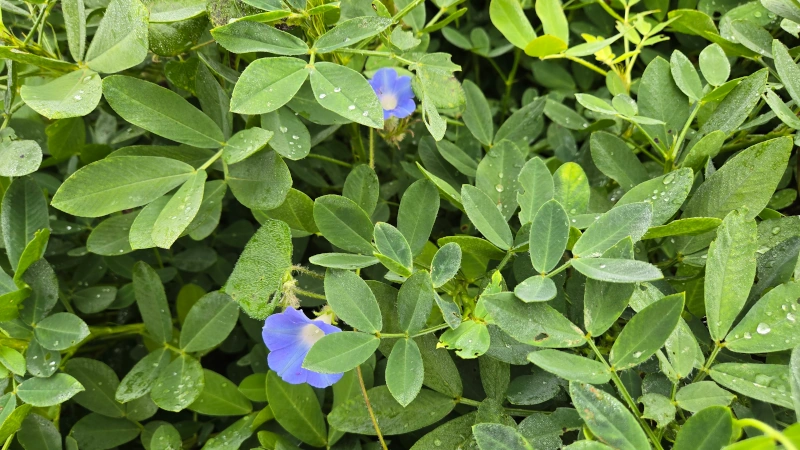
But my jaw dropped when Billy said, “Any misplaced plant is a weed.” Hold on, that actually means the pretty little Morning Glory is considered a weed! But I am happy to say they don’t pull them out.
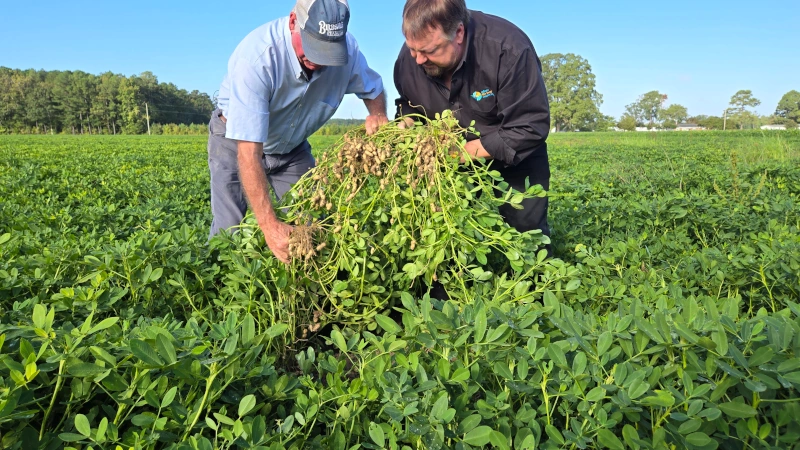
Full disclosure, before learning about this shoot I always thought peanuts grew on trees. Well, I could not have been more wrong – they grow underground. Billy and Chip dug some up and sure enough there they were.
Billy went onto explain the last week of April through the first week of May is a bit tricky. Billy, his brother Jesse Layne, and nephews James and Trent need to walk the fields daily and immediately attend to any issues that may pop up. Per Billy, “Peanuts know what to do and will do it quick.” I guess the rest of that thought is… and you better be ready for it.
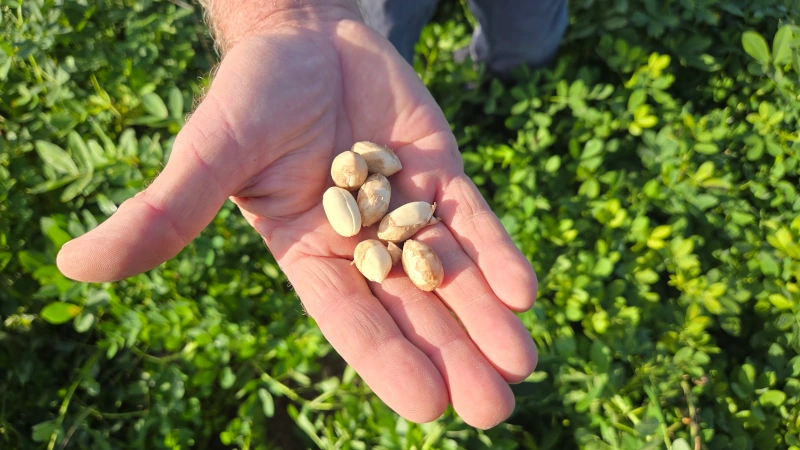
We did get to taste the peanuts – which are a legume and is why they grow underground – Billy is holding. Remember folks they weren’t dried but they still had a soft crunch to them with a consistency of a raw potato. I actually liked them but also knew if I ate too many, I would probably regret it.
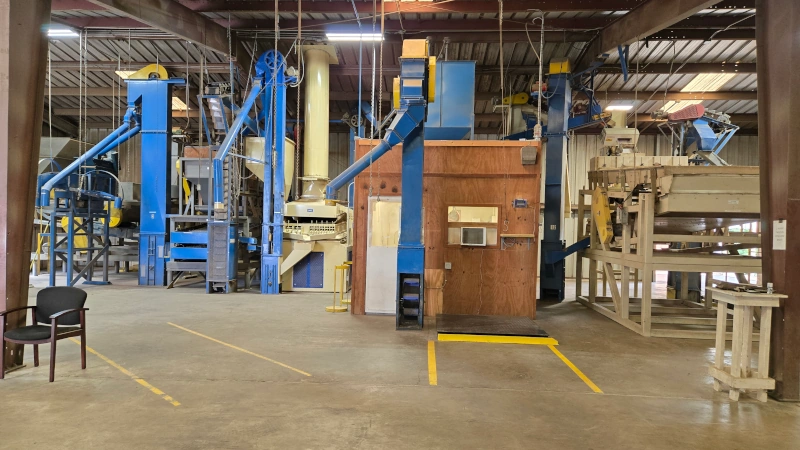
We did get the full tour of Indika Farms shelling mill, but unfortunately no peanuts equals no shelling. But Billy said something I think you should all hear, “Food safety is key to feeding people.” The shelling mill only processes peanuts ensuring there is no cross contamination and the cleaning and sorting process is pretty intense. Fun Fact: Indika Farms shell 40-tons of peanuts a day.

Trent Gwaltney & James Stephens
Getting ready to leave the farm we ran into Billy’s nephews, farm manager Trent Gwaltney and assistant farm manager James Stephens. Trent attended Auburn University and has a degree in agricultural business while James attended VA Tech and earned a degree in crop production. This is really special and here’s why – so many farmers do not have family who want to take over the business. But as Trent put it, “I can’t imagine doing anything else.” Trent and James have discussed and agreed to keep the farm going. And that makes my heart happy.

Onward to Jones Farm. Jones Farm, like so many, grow different types of crops. And Chip’s interview took place with vice president Kirk Jones in the cotton field.
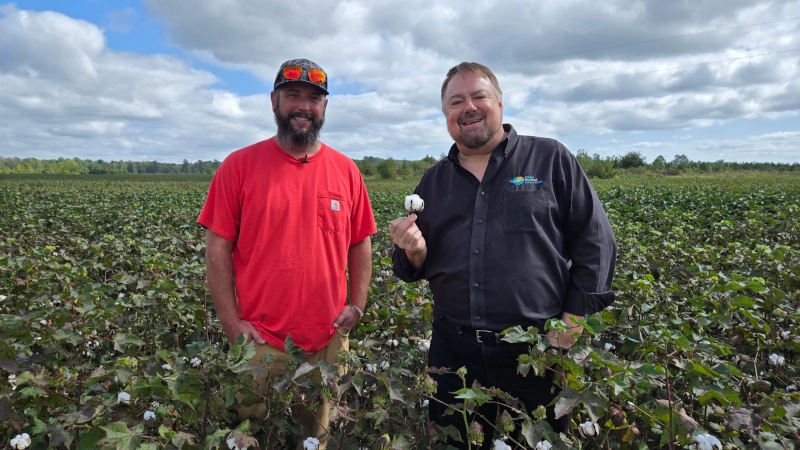
Kirk Jones & Chip Carter
Kirk talked about driving the tractor when he was four-years-old. I hear this over and over again and can’t help but chuckle and think: Boys and their tractors. Kirk told Chip his dad didn’t make him work on the farm but when he got older, he realized what a blessing his dad is. He went onto to say, “If you don’t love this life, it will chew you up and spit you out.” I can totally see it. In case you’re wondering Kirk is a fifth-generation farmer on his dad side and third-generation on his moms.

Now mind you we are in the country with narrow roads and when you look at the size of the equipment you can’t help but wonder how do they get it from one place to another? Kirk has some interesting stories about that.
He told us due to labor shortages they have had to purchase bigger equipment. The farmers actually call each other before going on the road to make sure no one else will be driving their huge equipment. Can you imagine the traffic jam that would cause? Things you just don’t think about unless you’re a farmer. Am I right?
Humor me here. As Kirk was telling us the next story, in my head I pictured an old woman. You know the type gray hair, short and with a cane.

Billy said, that his mom would drive the minivan and literally get out and stop traffic to let the equipment get through. But in my head, I visualize more of a granny than a mom hopping out and jumping up and down in the road waving her cane. I can truly picture the look on her face while waving the cane in the air if someone doesn’t cooperate.
Kirk said most of the time it works. But there is always that one person in a rush who speeds by just to end up needing to turn around. There’s one in every crowd (Thanks for letting me get that out of my system).
Chip asked Kirk how they felt about the peanut harvest being delayed. Kirk said, “Nervous as a cat in a room full of rocking chairs.” And what happened next was a bit of a miracle. Kirk got a phone call telling us that a farm down the road was harvesting peanuts!
It was a hike to get to the fields and, to me, with a bad knee, dangerous. The ground was extremely loose, 10-days of continuous rain will do that, and really difficult to maneuver. I kept telling myself – Donna watch your step. I know, I should have had my boots on.
The tractor you see in the above video is turning over the peanuts to allow them to start drying out in the sunshine and, hopefully, there will be a lot of it to get the process rolling.
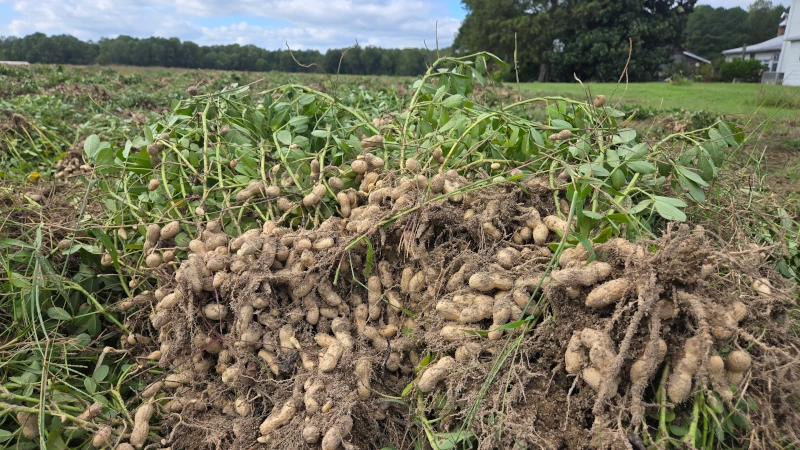

Sometimes Chip’s creative ideas can put us in slightly precarious situations. In this case it wasn’t Chip but the Executive Director of the Virginia Peanut Growers Association Caitlin Joyner. Caitlin’s idea was to shoot the opening or close of the show by a billboard along a major road — this is the spot where peanuts were first commercially planted in the United States!. UGH, more treacherous walking — but worth it.

Caitlin was right, the shot is great and it sums up the history of Virginia peanuts. Fun Fact: Virginia has been commercially farming peanuts since the early to mid-1840s.
Folks it has been a long morning and I am happy to say it was finally time for lunch.
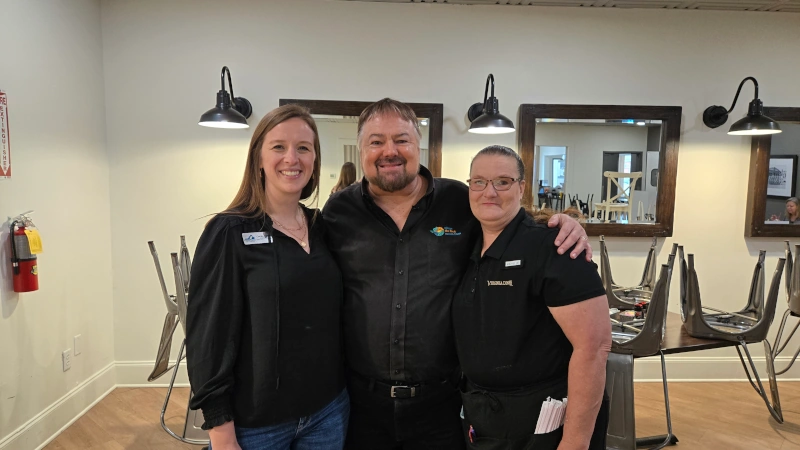
Caitlin Joyner, Chip Carter & Michelle Wages
We had a great lunch at the Virginia Diner in Wakefield, VA. And our experience was made even more pleasurable because of our waitress Michelle Wages, whom you’ll actually meet in the show. Thank you, Michelle.
Chip and Caitlin decided the diner was an excellent location to do her interview and it is my job to get permission to set up the cameras. Sounds easy but it wasn’t. And finally, after about an hour we got permission to roll.
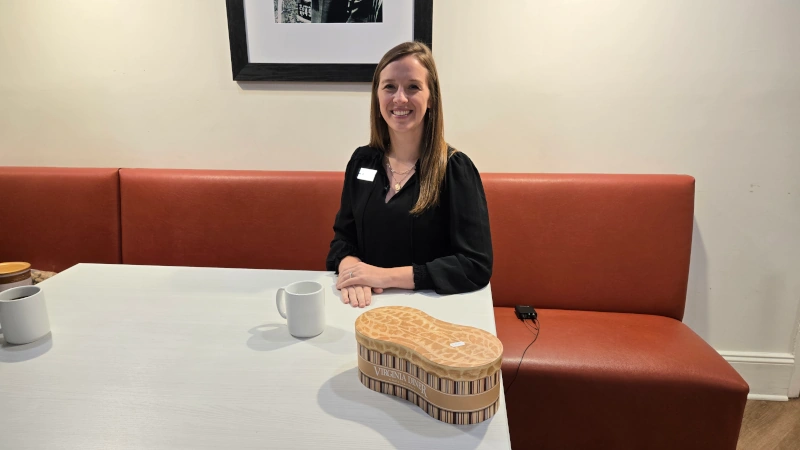
Caitlin Joyner
Over coffee and peanut pie, Caitlin and Chip talked about the health benefits of peanuts. Fun Fact: A ¼ cup serving of peanuts has: 207 calories, 9 grams protein, 3 grams fiber, and 18 grams of fat. Yeah, it does sound like a lot of fat, but it is the good kind that can actually help lower cholesterol.

Do you remember Mr. Peanut from Planters? Caitlin touched on this briefly, but I had to find out more. Turns out back in 1916 there was a contest and a young boy, Antonio Gentile, submitted his drawing and won the contest. Side Note: A commercial artist Andrew S. Wallach added the monocle, top hat, and cane.
Antonio’s family won five-dollars and became friends with the owner of Planter Peanuts Amedeo Obici. But it didn’t stop there. Obici paid for college for Antonio and for four of his siblings. Could it get any better? It can! He then paid Antonio’s tuition to medical school. I know I digressed, but it is such a good human-interest story I just couldn’t resist.
Fun Fact: Mr. Peanut actually has a name – Bartholomew Richard Fitzgerald-Smythe, now that’s a mouthful, and hails from Britain.

Now back to peanuts. We know they’re nutritious, but did you know growing peanuts acts as a natural fertilizer? Being a legume, peanuts absorbs nitrogen from the air and once the unharvested part of the plant decomposes the nitrogen becomes available in the soil to be used by other crops. So, peanuts are sustainable as well! Natural nitrogen fertilizer helps reduce the cost of fertilizer and chemical runoff. I know, another digression but an important one. Moving on.
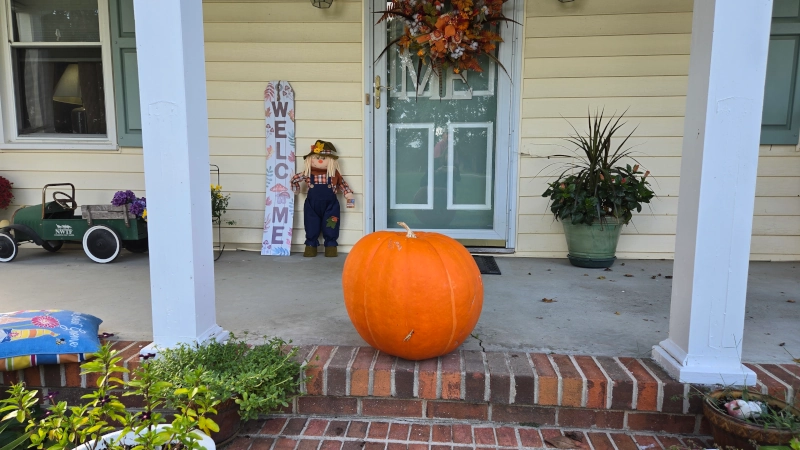
It had been a long day and we were running very behind schedule. But, what better way to end it than sitting on a beautiful front porch approaching early evening. Let’s meet co-owner of Doyle & Doyle Farms, Payton Doyle.

Payton Doyle & Chip Carter
The Doyles grow cotton, soybeans, corn, and peanuts. Payton spoke about how in 1940 his great grandaddy drove a school bus while tending the farm. And, like so many we farmers we have met, his earliest memory is – can you guess? – riding on the tractor.
Payton told Chip that he always knew this is what he wanted to do and went on to say, “Life is perfect. But I’m not saying it’s easy.” Words to take to heart.
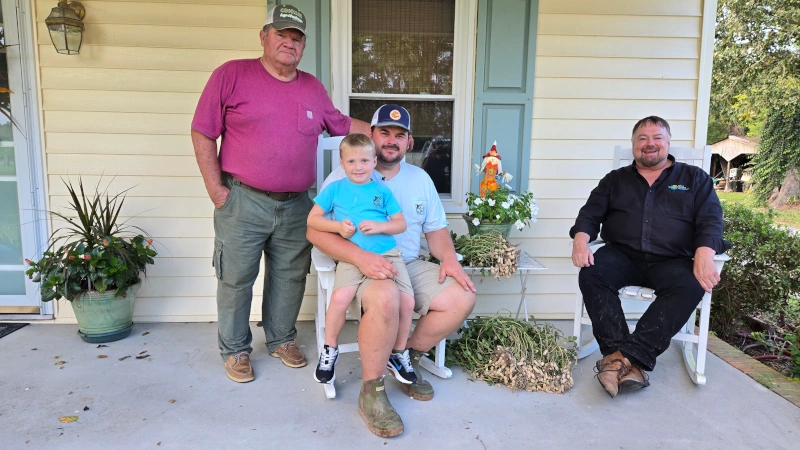
By this time Payton’s wife, 7-year-old daughter, and 4-year-old son came home. With his son on his lap and father and co-owner Joey Doyle looking on, Chip finished the interview. You will hear it all in the episode.
I want to extend my thanks to Caitlin Joyner for coordinating the day and to the Virginia Peanut Growers Association for contributing two recipes to the Where The Food Comes From Cookbook – Virginia Peanut Soup and Southern Peanut Pie.
Our Day Has Come To An End And Like They Say